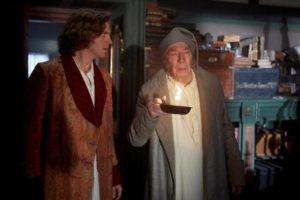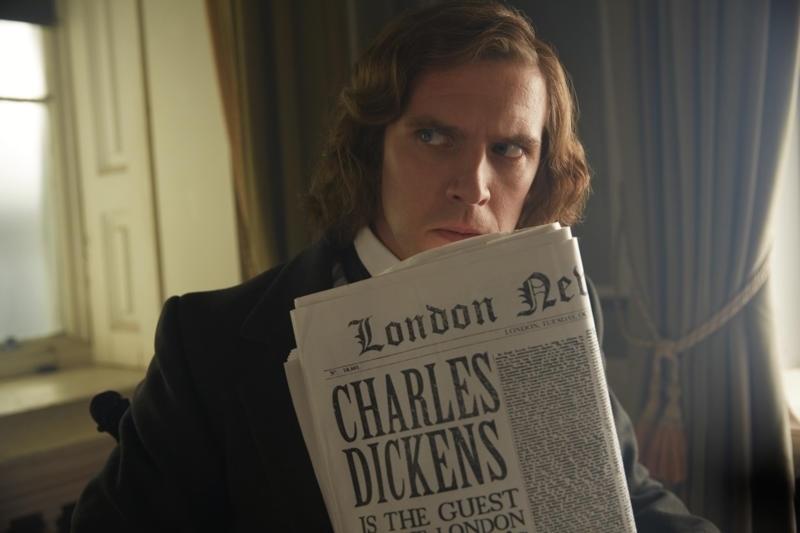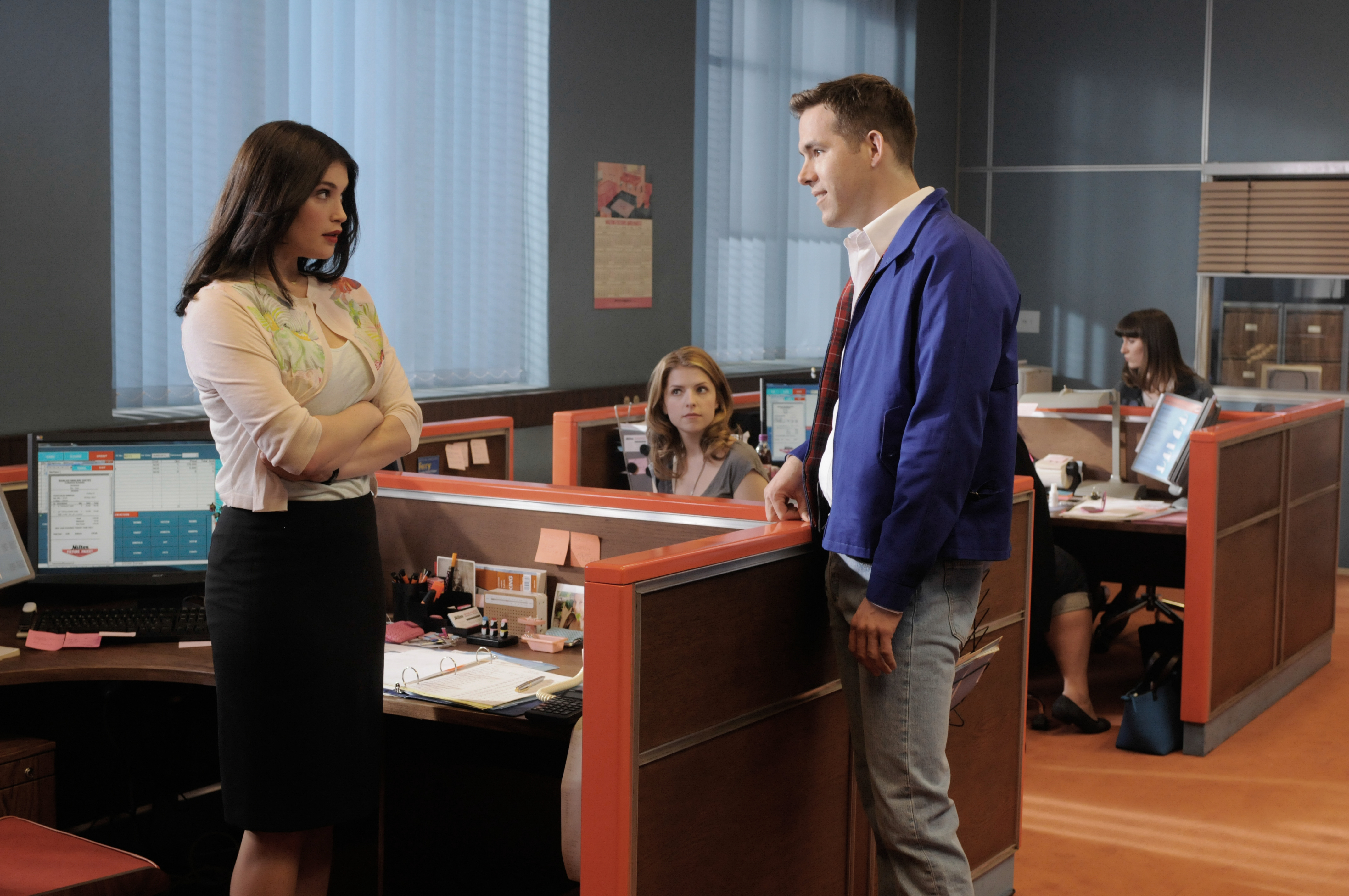Help me out: when a movie makes you want to read a book, is that a good thing or a bad thing? I’m going to call it a good thing. But maybe ask me again if I say the same thing following a Michael Bay picture. Did Charles Dickens “invent” Christmas as the title suggests? Technically, didn’t Jesus Christ invent Christmas? Forgive the glib, but the titular accusation requires an understanding of history that I do not have entirely. What was our collective allegiance towards the holiday before and after Dickens penned A Christmas Carol? I might need a different film for that answer; this one was almost entirely concerned with getting Chucky D. to write the thing in the first place.
Charles Dickens (Dan Stevens) wrote Oliver Twist in the late 1830s, which cemented his international celebrity. The prolific author found the time in-between stage show book tour revues and having more children to write an additional three entire novels, all failures, by late fall of 1843. I write a ton and I think that’s insane. Even Stephen King thinks maybe you could tone it down a notch. I continue to host a mistaken notion that genius is appreciated by contemporaries, hence, Charles Dickens was constantly well-to-do, yes? Well, yes-and-no, it turns out. Yes, in that he owned a multi-story brownstone in London capable of keeping wife, servants, and an insane amount of children with room left over for a private study and guest room. For all the Twisted success, however, the film contends Charley’s gift-horse retreated to the stable. I’m more than a bit skeptical Oliver Twist wasn’t still making money, but, truth be told, almost anyone can spend beyond his means. In addition, Charles found himself in debt to creditors, interior decorators, and the occasional lawyer, “Good news: you won your case! Bad news: stones don’t bleed. Here’s my bill.” Bottom line: when Charles got the inspiration to write A Christmas Carol, he went heavily into debt to self-publish.
Dickens fans will love the sprinkling of Carol clues throughout the London from which Charles derives his fiction. One rock-solid screenplay coup is the personification of Ebenezer Scrooge (Christopher Plummer). Dickens argues aloud that once you’ve identified a character’s name, the target springs to life (and, apparently, grants several interviews). This is my favorite part of the movie – while the Frankensteinian creation is an obvious fiction, Scrooge is, arguably, the most recognizable fictional character in the entire English language. If you believe in the power of words, as I do, who is to say Scrooge didn’t figuratively if not literally come to life once named?
This leads to a dilemma: who, indeed, wrote A Christmas Carol? Logic would say, “Dickens,” but it looks like the people of London and Scrooge himself are creating this work of fiction just to taunt the man. So long as all these folks remember there’s a deadline: You will not believe this, but Charles Dickens began writing A Christmas Carol in November of 1843 entirely with the purpose of having it available in bookstores by Christmas. One could argue that inspiration doesn’t need a lot of time. One could also argue that Dickens’ wife, children, parents, servants, and friends all suffered in the process. I am of a mixed mind in reporting how much glee I found watching the author visibly frustrated by constant interruption. Writing this review, I have hidden myself away from distraction, and yet, well, you can’t be Charles Dickens without accumulating a fair amount of responsibility. And the only word that comes to mind when picturing Dickens and those who count on him is: neglect.
Oh, that may be a little harsh. It’s hard to tell. Dan Stevens -who is well on track to becoming the Hugh Grant of this generation- is so naturally charming, you’re likely to forgive his sins. The question is are we forgiving them because Charles Dickens should have been allowed a selfish turn or five to indulge his own genius OR are we forgiving them because Dan Stevens seems like a nice guy?
forgive his sins. The question is are we forgiving them because Charles Dickens should have been allowed a selfish turn or five to indulge his own genius OR are we forgiving them because Dan Stevens seems like a nice guy?
With rare exceptions, like Shakespeare in Love, movies about writers writing generally suck, IMHO. And I swear, if I hear you utter “Barton Fink” at this point, I will find you and short-sheet your bed. There are very few things worse than watching writer’s block on film – that’s a movie about a writer who isn’t writing. It’s not fun. Ever. The writer’s block in The Man Who Invented Christmas isn’t necessarily fun, either. However, when you hit a brick wall and Scrooge shows up to sneer at you, that’s infinitely more entertaining than watching John Turturro spin his wheels. I call The Man Who Invented Christmas anorther exception to the writers-on-film rule made that much better depending on your familiarity with A Christmas Carol.
♪I’ve got this idea for Christmas
It’s a book you’ll want to read
In it, there a ghostly presence
Chides a miser for his greed
I can make my opus known
Macabre Noel chain and bone
Instruction all life’s fools
All I want for Christmas is ghouls♫
Rated PG, 104 Minutes
Director: Bharat Nalluri
Writer: Susan Coyne
Genre: The fictional non-fiction behind fiction
Type of being most likely to enjoy this film: Dickens fans, I imagine
Type of being least likely to enjoy this film: Pan-mongers
♪ Parody Inspired by “All I Want for Christmas Is You”



